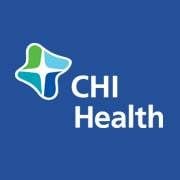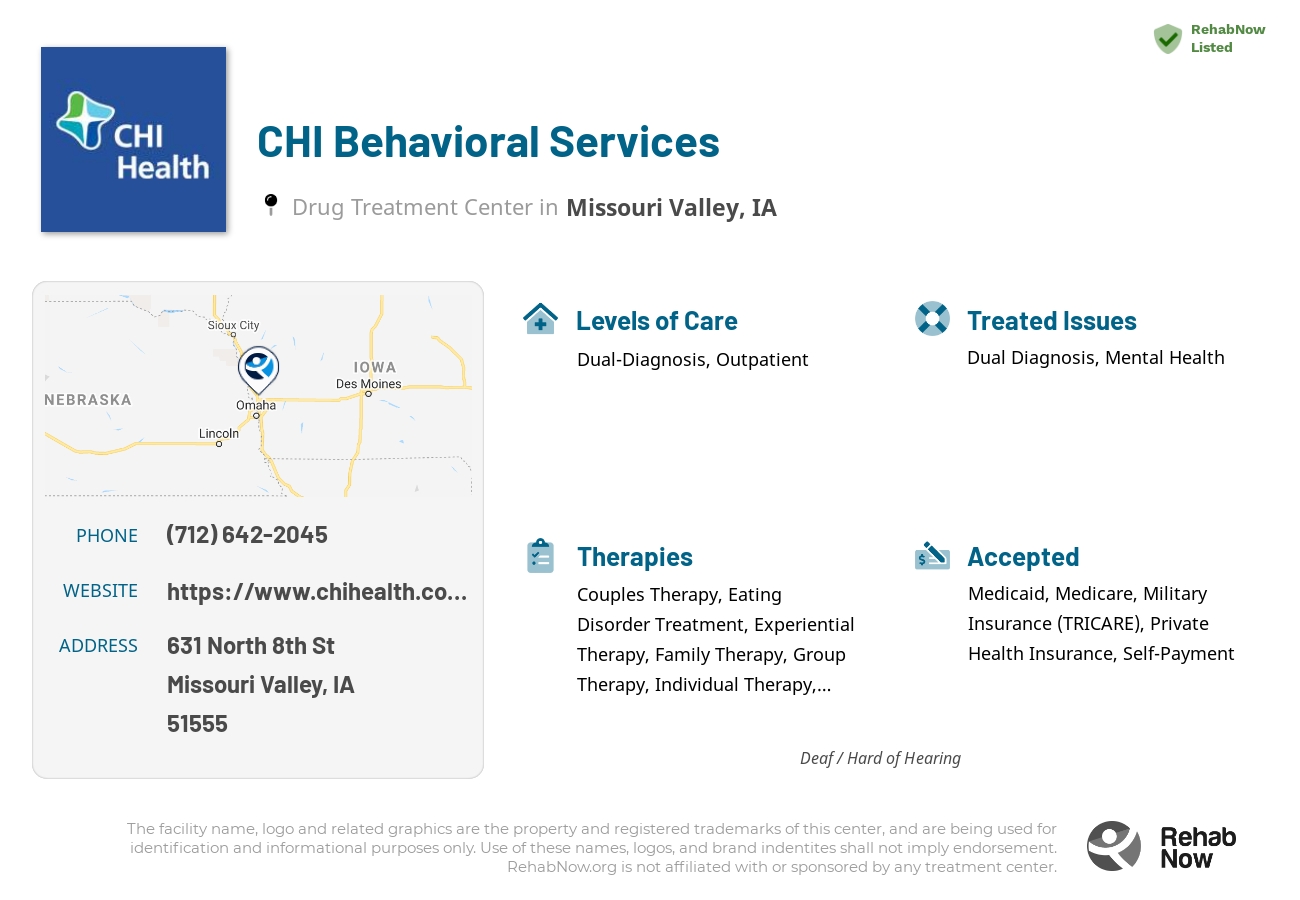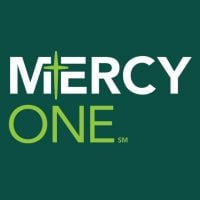CHI Behavioral Services
Drug Rehab Center in Missouri Valley, Iowa
CHI Behavioral Services in Missouri Valley, Iowa provides evidence-based treatment services for individuals and families struggling with substance abuse and addiction, offering comprehensive care including medication-assisted treatment, group and individual counseling, and family therapy, in a nationally accredited facility committed to providing high quality care and ensuring the best outcomes for their patients.
About CHI Behavioral Services in Iowa
CHI Behavioral Services in Missouri Valley, Iowa provides comprehensive treatment services for individuals and families struggling with substance abuse and addiction. Located in a rural area, this facility offers a safe and welcoming environment to those looking to get help and seek a healthier, more successful future. The staff at CHI Behavioral Services understands the complexities of addiction and provides an array of services tailored to the individual’s specific needs.
CHI Behavioral Services offers evidence-based treatments such as Cognitive Behavioral Therapy (CBT), Dialectical Behavioral Therapy (DBT), and Eye Movement Desensitization and Reprocessing (EMDR) to address substance abuse issues. In addition, it provides group and individual counseling, intensive outpatient treatment, family therapy, and sober coaching. This facility also offers medication-assisted treatment (MAT) to aid in the recovery process.
CHI Behavioral Services is nationally accredited by the Commission on Accreditation of Rehabilitation Facilities (CARF) and the agency is certified by the Department of Human Services and Office of Alcoholism and Drug Abuse (OADA). It is also a member of the National Association of Addiction Treatment Providers (NAATP) and is recognized as an employer of National Certified Addiction Counselors (NCAC’s). Additionally, the facility is committed to providing high quality care and ensuring the best outcomes for their patients.
Genders
Ages
Modality
Additional
Conditions and Issues Treated
Dual Diagnosis therapy is considered more successful than traditional rehab methods because it treats the addiction and the underlying mental health disorder simultaneously. This comprehensive approach gives Missouri Valley, IA patients the best chance for long-term recovery. If the patient does not receive treatment for both conditions, they are more likely to relapse.
Levels of Care Offered
This center offers a variety of custom treatment tailored to individual recovery. Currently available are Dual-Diagnosis, Outpatient, with additional therapies available as listed below.
Outpatient treatment consists of counseling and therapy sessions. The outpatient treatment process begins with the addict’s initial detox period, lasting about ten days. Outpatient treatment is used for those who are at moderate risk for “slipping back” into the addiction. It is also used for those who are not currently experiencing any side effects from withdrawal, can handle social pressure, have a stable living environment, and have a good support system.
Therapies & Programs
Individual Therapy is a crucial component of addiction recovery. Therapists work with patients to identify the root of their addiction and figure out how to better handle the issues that led to them using drugs. Individual Therapy is one on one sessions where people meet with their therapist. Individual therapy provides a safe space for people to open up and discuss personal and sensitive topics which they may not feel comfortable discussing in a group setting.
In this type of therapy, therapists can develop specific solutions for each patient, which helps speed up their recovery process. In addiction recovery, therapy is a crucial part. It allows patients to go deep into their core issues and discover how those problems can be better handled now. Therapy can be performed in individual sessions as well as group settings. In individual therapy for addiction, the patient meets with the therapist one-on-one to focus on the underlying issues of addiction and come up with solutions to prevent future abuse.
Addiction can take a heavy toll on relationships, damage the trust and intimacy that was once there. Couples therapy at CHI Behavioral Services helps to rebuild the trust and intimacy that has been damaged. An intimate relationship with a drug addict is not healthy for children or anyone in the family. Therapist help to rebalance family roles and create a healthier environment after rehab in Missouri Valley, IA.
Family therapy is a crucial part of drug treatment and getting sober. It is one of the most effective ways to help addicts stay on the path to long-term sobriety. One of the most important parts of family therapy is the relapse prevention plan. During treatment, therapists and doctors will often sit down with the addict and their family to develop a plan if the addict ever feels like they want to use again. This plan should involve steps the addict and family can take together to prevent them from relapsing in the future.
An addict’s family can play a vital part in helping them to avoid relapse because they can spot the warning signs and help them get back on track before it becomes too much of a problem. Family therapy is one of the most effective ways to help addicts stay on the path to long-term sobriety.
Group Therapy is employed by drug treatment centers like CHI Behavioral Services to provide the recovering addict with a platform to talk about their feelings and experiences. It also provides for an opportunity to learn from other addicts who have successfully overcome their addiction. It is recommended that all group members be recovering addicts for this type of therapy to work.
This type of therapy involves the use of a variety of therapeutic techniques to help addicts recover from past traumas that might have triggered their substance abuse. During these sessions, therapists will work with the addict to address painful memories and learn how to cope effectively with stressors as they arise.
During these types of sessions, therapists will typically focus on three main goals:
- Identifying and expressing painful emotions associated with past traumas.
- Reducing the effects of stress on an addict’s life by developing more effective coping mechanisms.
- Developing healthy ways of thinking about stressful situations that can help addicts avoid substance abuse issues in the future.
This type of therapy is typically used in conjunction with other types of addiction treatment services. By identifying and dealing with the root cause of addiction, most addicts can overcome their cravings and prevent relapse once they leave rehab.
Many different types of addiction treatment services exist to help addicts safely get sober, but it’s important for recovering individuals to find a therapist or support group that will help them address the root cause of their addiction.
Cognitive Behavioral Therapy (CBT) is an approach and method in psychotherapy. CHI Behavioral Services asks people to investigate how their thoughts, including habitual, harmful, and inaccurate ways of thinking, affect behaviors. CBT is based on the idea that rigid, inflexible ways of thinking cause people to have a limited ability to cope with stress, which leads to emotional distress.
Likewise, CBT helps people identify maladaptive behaviors and replace them with more positive behaviors. It makes you look at the way you perceive something and ask: Is this a realistic belief? CBT asks people to look at the role of behaviors and emotional responses and how they may be distressing in one’s life. The goal of CBT is to change the way people think and behave to achieve a more balanced, healthier lifestyle.
Moreover, CBT has been shown to reduce some types of anxiety disorders, depression, and symptoms related to thoughts or actions that are considered harmful.
Good nutrition can be difficult for people recovering from addiction because they may not feel like eating while they are experiencing the physical and emotional side effects of detoxing.
Nutrition therapy can help addicts in Iowa in the following ways:
- Helps individuals to understand which foods promote good health and support recovery that will assist them during detox
- Provides guidance and education about how to maintain a nutritious diet so they can stay healthy during recovery
- Improves their overall health and well-being, which can reduce the severity of substance withdrawal symptoms.
Nicotine replacement therapy treats nicotine addiction using external sources of nicotine, such as patches or gum to substitute for nicotine. This allows people trying to quit smoking to get their desired dose of nicotine without actually having to smoke cigarettes. There are several different types of NRT devices on the market now, and it is important to talk to your doctor about the best kind for you.
Patient Experience
Experiential Therapy at CHI Behavioral Services
Experiential therapy at CHI Behavioral Services includes helping people work through emotional disorders by participating in events in real-time. It moves away from conventional talk therapy to discuss their concerns and emotions by making patients play roles or use props. It allows people to handle trauma and feelings healthily, reducing the need to resort to alcohol and substances in Missouri Valley, IA.
Payment Options Accepted
For specific insurance or payment methods please contact us.
Is your insurance accepted?
Ask an expert, call (888) 674-0062
Additional Details
Specifics, location, and helpful extra information.
Missouri Valley, Iowa 51555 Phone Number(712) 642-2045 Meta DetailsUpdated November 25, 2023
Staff Verified
CHI Behavioral Services Patient Reviews
There are no reviews yet. Be the first one to write one.
Missouri Valley, Iowa Addiction Information
Iowa ranks 2nd lowest in the nation for illicit drug use, but 12% of its residents are still using these drugs every single year. Methamphetamines account for more than 90% of all drug-related prison admissions in Iowa. Alcohol is the most widely abused substance in the state, with 23% of residents admitting to heavy drinking.
Treatment in Nearby Cities
- Creston, IA (86.5 mi.)
- Orange City, IA (100.3 mi.)
- Bloomfield, IA (189.2 mi.)
- Cherokee, IA (83.9 mi.)
- Clarion, IA (136.8 mi.)
Centers near CHI Behavioral Services
The facility name, logo and brand are the property and registered trademarks of CHI Behavioral Services, and are being used for identification and informational purposes only. Use of these names, logos and brands shall not imply endorsement. RehabNow.org is not affiliated with or sponsored by CHI Behavioral Services.






